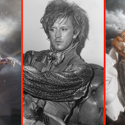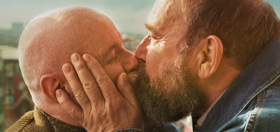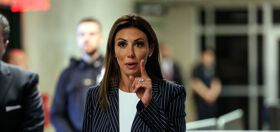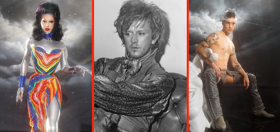
For this installment of The Narcissist Issue, we turn our eyes to Ari Gold, a gay singer whose lungs are only matched by his looks. We must mention that the interview originally took place via telephone, but the technological demons shat all over us, so we had to redo it via electronic mail. Our deep apologies to Mr. Gold who, we admit, was far more eloquent that we expected. Next time you’re in town, Ari, drinks are on us.
After the jump read what he has to say about the relationship between gay and mainstream media, how we need to stop with all the gay-on-gay hate, and why it’s alright to be narcissistic.
(Oh, and we’ve also included Gold’s video for “Wave of You,” which was recently named the third sexiest video of all time by Logo! See? We do love you.)
QT: So, Ari, first allow me to apologize for all the trouble around this interview. It’s been a real mess, and you’ve been a real mensch about it. Speaking of mensch, you were discovered while singing at your brother’s bar mitzvah. From there, you started what’s been a very illustrious career. Was singing/performing always something you wanted to do, or were there other dreams that fell by the wayside?
Ari Gold: Yes, singing and being a performer was always something I wanted to do. I had my first demo when I was 12 years old, and I started writing songs when I was about 15. While I thought I would be a pop star much sooner, I’m glad my career happened the way it has, because now I actually have something to say as an artist. I’ve had time to actually live life. It makes me a much better and more interesting artist, I think.
How about we take this to the next level?
Our newsletter is like a refreshing cocktail (or mocktail) of LGBTQ+ entertainment and pop culture, served up with a side of eye-candy.
QT: During our first interview, I asked you if you felt pressured as a child, if you felt as if the adults around you had complete control over your life. You mentioned that no children have power over their lives. So, are you thankful for the direction you’re life has taken?
AG: Children certainly are very vulnerable. I’m not sure if they should be given control over their lives. I may have had a bit too much responsibility as a child being in show business, since I was six and having to work in an adult world and also bringing in money to my family.
QT: Are there any other singers you particularly admire? Anyone you wish to emulate?

AG: When I was younger I certainly had my idols: Madonna, George Michael, Michael and Janet, Whitney and Mariah. Madonna was the only one who was sending out a message that it was okay to be gay, which was really important for me to hear at the time.
At this point in my life I definitely don’t need to emulate anyone. I’m just trying to be the best me as possible! I hope that by being out in my life and my work that I can make people feel like it’s okay to be who they are. I think actually having a gay man saying that to gay men is progress, [rather than only hearing it] from our beloved divas. I do also have a wonderful friendship with Rupaul. He is very inspiring to me and gives me great advice about being in this business and just being alive.
QT: You’ve certainly garnered a lot of attention within gay communities. How do you feel about a distinct, somewhat isolated gay culture? What are your opinions on the rise of “gay” television?
AG: I think gay television is a great thing. I think if we are ever going to be more integrated in mainstream culture, we have to do things for ourselves first. We have to learn how to support each other and create our own spaces for us to thrive. If we learn how to do that, we can definitely cross over.
The mainstream media is not going to care about us if we don’t seem to care about ourselves. We shouldn’t pay more attention to some straight actor playing a gay role then we do a gay actor playing a role. But “gay television” is not necessarily isolated. It’s on TV. Anyone can tune in and I’m sure plenty of non-gay people do. Look at what black people have done with hip-hop music and culture. That happened because they were buying each other’s records first, then white people caught on.
QT: Gays get a lot of flack for being “narcissistic,” what’s your take on that? Do you agree?
AG: Narcissism gets a bad rap. There are so many forms that it takes. Being in the extreme and not caring about anyone but one’s self, being an egomaniac, no, that’s not a good thing. Being into yourself and celebrating your body and sexuality, taking care of the outside as well as the inside, those are good things. If that’s narcissism, then so be it. Women have been called narcissistic for centuries and that is something used against them when it probably is more likely a product of sexism and the way men have defined women by the way they looked. Context is everything and moderation is key.
QT: What, if anything, would you change about gay communities?
AG: I would want to put an end to some of the self-hatred that I see happening within the community. I think we are still learning how to support each other and celebrate ourselves. Its a process, I guess, but I wish more gay people would see how powerful we really are. For example, if you work in the media, you have the power to create [gay] stars. We don’t have to put straight people on the cover of our magazines. But if we are gay, at any job, by being out, by supporting each other, we have the power to change people’s minds including our own minds.
QT: You’ve done a coffee table book in which there are more than a few pictures of your attractive self. How do you feel about selling your face, rather than your voice? Or, do you feel the two go hand in hand?
AG: In the music business, image and music do go hand in hand, so for me it was a great opportunity to get my image and my music out there in 25 countries. The book comes with a remix CD. But I also did the book cause I thought it was an opportunity to have a gay male sex symbol that is an artist and proud of whom he is. We spend a lot of time looking at photos of half naked men, many of whom are straight models. Why not eroticize someone who actually does something, who is saying something and who we know is gay? Isn’t that psychologically “healthy”? Celebrating our bodies and sexualities is a positive thing as long as we don’t define ourselves by that. Trying to negate our sexuality so that straight people will find us more appealing is not a good thing either. So my goal with the book was to try and be sexual and be erotic, but also to say something with my music, my lyrics, and the text by Boy George, Kevin Aviance and Rupaul and with the introduction that I wrote about who I am as a gay man. It’s a celebration of being gay and proud.
QT: You’re now repping iline cosmetics? What drew you to the brand?
AG: The founder of the company, Irwin Rappaport is also a make-up artist and he did my make-up for a few events. I actually don’t really wear make-up when I perform, but the way he did my make-up was so natural it didn’t look like I was wearing any. I just had a glow. He thought I’d be a great person to represent the company so I said yes!

(photo: Jason Miller)




















Brandon
Goddamn that man is fine!!! Oh La La
Samara Riviera
Wow! Ari Gold is certainly amazing. I’ve had the pleasure of interviewing him and must say I fell in love with this gay man and now that I see he included transsexuals in his video I give him so many more props because there was absolutely no reason for him to do so but yet he does. I am an even bigger fanatic now. Muah*
Samara Riviera
UweB
I like Ari Gold, He s a great Artist and handsome Guy.
Great that he takes stands for the Gay People.
The PhotoBook with the Remixes CD is published in Germany by editor Bruno Gmünder – great. You see we know what’s Quality here. Uwe
Diamond from Compton
I’ve never knew who ari gold was until i found out he was attending the Hustla Ball in Vegas, i looked him up and tried to figure out what the big fuss was about, when i saw himi said “GOD DAMN”.. and so i started doing a little more reading Vs. pic. and i got more intrested in his growing up culture, ad this interview. which i’m sure i can really understand. But one thing as to growing up gay in the gay scene, and being gay away fom the gay scene. Latins, here in LA have houses, as so do blacks, what trips me out is we’re all one gy family, and yet we all still clash against eachother. As if we don’t have enough with the world hating us, we have to hate eachother.
Great reading this Ari…
Ari, when u see RuPaul, tell that girl wasup 🙂 never net her wish i did..
xoxoxo
*D*
Raimonds
Ari is the cool singer!
Apollo GT
I’m glad to have learned of the name Ari Gold from Irwin of I Line For Men.